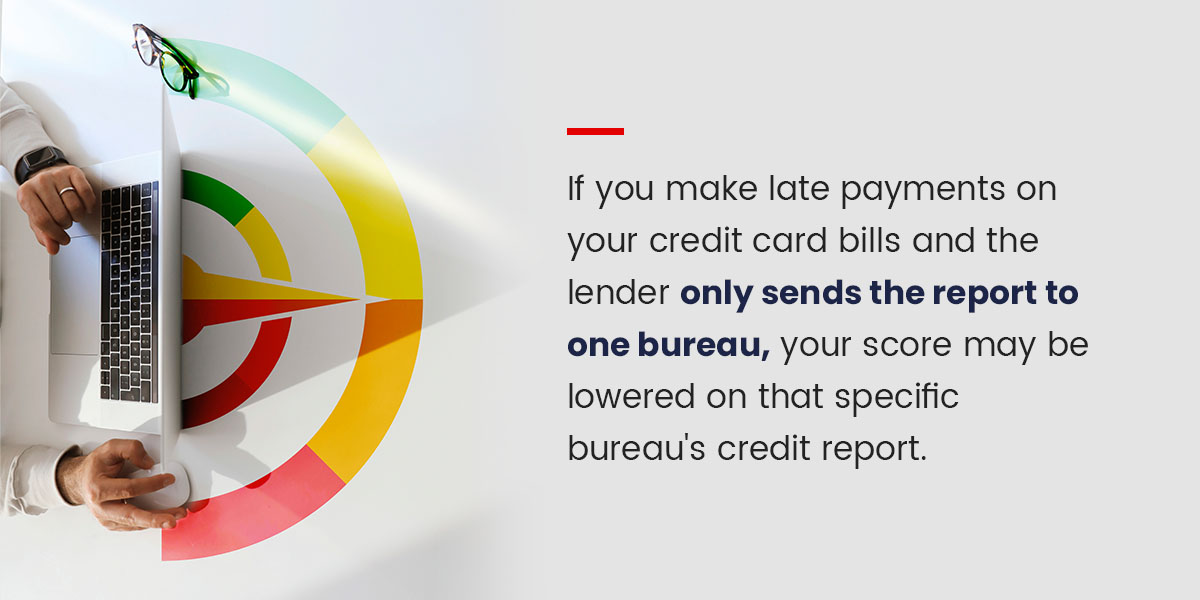
The FICO score is only one kind of credit score, and each credit score model has different methods, mathematical algorithms, or criteria for making the calculations. Again, your FICO scores may also differ depending on the information provided by the credit reporting bureaus. For example, if you make late payments on your credit card bills and the lender only sends the report to one bureau, your score may be lowered on that specific bureau's credit report.
How Can You Improve Your Credit Score?
There are a few ways you can improve your credit score, including the following:
- Make early payments: One of the best ways to improve your credit score is to pay your debt on time and in full. This is because your payment history and behavior are significant contributors to your credit score across the various models. Contact your creditor immediately when you miss your payments by 30 days or more or realize in advance that you may delay payments.
- Maintain your old accounts: Maintain old accounts even after you pay off your balance. Neglecting to do so may raise your credit utilization rate and lower your overall score.
- Check your credit reports frequently: Your credit scores are based on your credit report, so check your reports frequently for errors. One mistake can make a huge difference in your credit score. Thus, disputing your credit report errors can prompt the reporting agency to make the necessary adjustments.
- Ask for higher credit limits: High credit limits and stagnant balances lower overall credit utilization, which improves your credit score. You may get higher credit limits if your income increases or you add more years of positive credit experience.
- Pay credit card balances strategically: How you pay credit balances affects your credit score. For example, your credit utilization drops when you use less than 30% of the limit on your credit card. In that case, the card issuer reports a lower balance to the credit bureaus.
- Become an authorized user: If your friend or relative has a credit card account with a good repayment history and a high credit limit, you may ask them to add you as an authorized user. That allows you to benefit from the primary user's positive records. The account holder may add you as an authorized user without letting you use the card or giving you the account number.
- Use secured credit cards: Secured credit cards backed by cash deposits — the deposit amount is typically the same as your credit limit, and it lets you pay upfront. You can use them like regular credit cards, and your on-time payments improve your credit score.
- Pay off collections accounts: Paying off collections accounts reduces the threat of being sued over a debt. Having an account in collections negatively impacts your credit reports, so if you resolve the issue, your credit score might improve.
Boost Your Credit and FICO Scores With a Personal Loan From Atlas Credit
When it's time to get a loan, you need to know that your credit score is high enough to be approved. In many situations, without a reasonably high credit score, you may be unable to purchase that car you need or buy your dream home.
However, before you start to make changes to help boost your credit score, it may help to fully understand the difference between that number and your FICO score. Below, we discuss the similarities and differences, so you feel fully informed and can make the right adjustments to improve your credit.
Apply For a Personal Loan Online
What Is a Credit Score?
A credit score is a three-digit number that represents and rates a borrower's credit history of repaying loans and lines of credit. It gives lenders an overview of the borrower's risk and is a barometer of the borrower’s ability to pay, not a guarantee of payment. While a high credit score informs the lender there's a low risk of the borrower defaulting on a loan or line of credit, a low credit score tells lenders that the borrower has a high risk of default.
These scores are generated from information in credit reports provided by the three major credit rating bureaus, Equifax, Experian, and TransUnion, which are obtained from lenders and other institutions. These monthly credit reports contain information about how much credit borrowers use and their payment histories.
What Is a FICO Score?
FICO scores are credit scores derived from the Fair Isaac Corporation (FICO). These scores were created in 1989 in response to the need for an industry-wide standard credit score for evaluating risk. Since its introduction, the FICO score has become one of the best-known and widely used ways to gauge credit.
There are five essential factors used in calculating your FICO score:
- Payment history: Payment history makes up 35% of your FICO credit score. Thus, paying your loans on time improves your score, while missed and late payments may decrease your score. Bankruptcy can also affect your score.
- Credit age: Credit age is 15% of your FICO credit score, and it measures the average duration in which you use credit. The older your credit age, the better.
- Credit utilization: Credit utilization is 30% of your FICO credit score calculation. This is the percentage of available credit you use within a period. The less your credit utilization, the better your score.
- New credit: New credit or credit inquiry is the number of hard inquiries on your account. Applying for new credit too often can affect your FICO credit score, so research credit card offerings and eligibility requirements or wait three to six months between your credit applications. Credit inquiries account for 10% of your FICO credit score.
- Credit mix: Credit mix considers the type of credit you use and revolving credit or installment loans. This accounts for 10% of your FICO credit score calculations.
FICO vs. Credit Score: What's the Difference?
All FICO scores are credit scores, but not all credit scores are FICO scores. There are other kinds of credit scores, such as VantageScore, which the credit bureaus created as an alternative to FICO in 2006. However, most lenders rely on FICO scores when deciding credit approvals, interest rates, and terms.
Why Is Your FICO Score Lower or Higher Than Your Credit Score?

The FICO score is only one kind of credit score, and each credit score model has different methods, mathematical algorithms, or criteria for making the calculations. Again, your FICO scores may also differ depending on the information provided by the credit reporting bureaus. For example, if you make late payments on your credit card bills and the lender only sends the report to one bureau, your score may be lowered on that specific bureau's credit report.
How Can You Improve Your Credit Score?
There are a few ways you can improve your credit score, including the following:
- Make early payments: One of the best ways to improve your credit score is to pay your debt on time and in full. This is because your payment history and behavior are significant contributors to your credit score across the various models. Contact your creditor immediately when you miss your payments by 30 days or more or realize in advance that you may delay payments.
- Maintain your old accounts: Maintain old accounts even after you pay off your balance. Neglecting to do so may raise your credit utilization rate and lower your overall score.
- Check your credit reports frequently: Your credit scores are based on your credit report, so check your reports frequently for errors. One mistake can make a huge difference in your credit score. Thus, disputing your credit report errors can prompt the reporting agency to make the necessary adjustments.
- Ask for higher credit limits: High credit limits and stagnant balances lower overall credit utilization, which improves your credit score. You may get higher credit limits if your income increases or you add more years of positive credit experience.
- Pay credit card balances strategically: How you pay credit balances affects your credit score. For example, your credit utilization drops when you use less than 30% of the limit on your credit card. In that case, the card issuer reports a lower balance to the credit bureaus.
- Become an authorized user: If your friend or relative has a credit card account with a good repayment history and a high credit limit, you may ask them to add you as an authorized user. That allows you to benefit from the primary user's positive records. The account holder may add you as an authorized user without letting you use the card or giving you the account number.
- Use secured credit cards: Secured credit cards backed by cash deposits — the deposit amount is typically the same as your credit limit, and it lets you pay upfront. You can use them like regular credit cards, and your on-time payments improve your credit score.
- Pay off collections accounts: Paying off collections accounts reduces the threat of being sued over a debt. Having an account in collections negatively impacts your credit reports, so if you resolve the issue, your credit score might improve.

Boost Your Credit and FICO Scores With a Personal Loan From Atlas Credit
Atlas Credit offers affordable credit to those with an immediate need for credit. If your bank, credit issuer, or lender has turned you down, we're here to help you. With one of our personal loans that fits right into your financial budget, you can improve your credit score by making timely payments.
Our application process is simple and convenient. Apply for a loan now!


